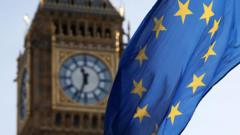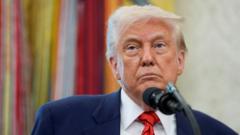As the UK and EU prepare for their first summit since Brexit, discussions will center around geopolitical concerns, trade barriers, and defense collaborations amid ongoing challenges.**
UK-EU Summit: A Historic Reset Amid Complex Negotiations**

UK-EU Summit: A Historic Reset Amid Complex Negotiations**
The first bilateral summit between the UK and EU post-Brexit focuses on security, trade, and cooperation as both sides seek to mend relations.**
The long-awaited bilateral summit between the UK and the EU, set for Monday in London, marks a significant step in post-Brexit relations, though participants are advised to temper expectations. Officials and analysts across both sides recognize that while the lingering bitterness of Brexit may have receded, considerable challenges persist.
A backdrop of global tensions, particularly regarding Russia’s actions in Ukraine and China’s geopolitical maneuvers, has created a renewed impetus for collaboration. As observed by Anand Menon, director of the think tank UK in a Changing Europe, all parties are aware that failure to unify in these challenging times could have adverse repercussions, particularly for European leaders.
Heightened discussions around security and economic stability have positioned the upcoming summit as crucial, particularly with news that French President Emmanuel Macron has received an invitation for a state visit later this year. This suggests an attempt by the UK to smooth relations with France, which has played a hardball role in negotiations leading up to the summit.
Several key outcomes are expected, including a joint declaration on shared foreign policy priorities, a security and defense pact, and measures aimed at reducing trade barriers imposed by Brexit. However, ambitions for a complete overhaul of trade relations remain constrained by the UK government’s established red lines of not rejoining the EU’s customs union or single market.
Despite a growing desire among the public for enhanced trade with the EU, the Labour government is faced with concerns over electoral backlash from Eurosceptic factions. As negotiations intensify, addressing sector-specific issues like animal and plant health trade agreements remains a priority. An SPS agreement is aimed at easing post-Brexit trade complications, albeit with conditions attached that may not sit well with Brexit supporters.
Further complicating negotiations are ongoing discussions about fishing rights in UK waters, with EU nations demanding long-term agreement as the current one nears expiry. The Labour government’s commitment to tightening immigration policies poses another challenge in broader conversations about youth mobility and visa regulations.
On the defense front, the EU-UK security pact is seen as a foundation for future collaboration, although hurdles persist regarding access to EU defense contracts. The patchwork of divergent interests among EU nations, especially France's restrictive stance against non-EU bidders, must be navigated carefully to align interests and ensure cooperation.
Overall, the summit represents a critical moment for UK-EU relations as both sides strive to move past the acrimonious Brexit era and forge a pragmatic path forward in defense, security, and trade discussions amidst complex and evolving geopolitical landscapes.
A backdrop of global tensions, particularly regarding Russia’s actions in Ukraine and China’s geopolitical maneuvers, has created a renewed impetus for collaboration. As observed by Anand Menon, director of the think tank UK in a Changing Europe, all parties are aware that failure to unify in these challenging times could have adverse repercussions, particularly for European leaders.
Heightened discussions around security and economic stability have positioned the upcoming summit as crucial, particularly with news that French President Emmanuel Macron has received an invitation for a state visit later this year. This suggests an attempt by the UK to smooth relations with France, which has played a hardball role in negotiations leading up to the summit.
Several key outcomes are expected, including a joint declaration on shared foreign policy priorities, a security and defense pact, and measures aimed at reducing trade barriers imposed by Brexit. However, ambitions for a complete overhaul of trade relations remain constrained by the UK government’s established red lines of not rejoining the EU’s customs union or single market.
Despite a growing desire among the public for enhanced trade with the EU, the Labour government is faced with concerns over electoral backlash from Eurosceptic factions. As negotiations intensify, addressing sector-specific issues like animal and plant health trade agreements remains a priority. An SPS agreement is aimed at easing post-Brexit trade complications, albeit with conditions attached that may not sit well with Brexit supporters.
Further complicating negotiations are ongoing discussions about fishing rights in UK waters, with EU nations demanding long-term agreement as the current one nears expiry. The Labour government’s commitment to tightening immigration policies poses another challenge in broader conversations about youth mobility and visa regulations.
On the defense front, the EU-UK security pact is seen as a foundation for future collaboration, although hurdles persist regarding access to EU defense contracts. The patchwork of divergent interests among EU nations, especially France's restrictive stance against non-EU bidders, must be navigated carefully to align interests and ensure cooperation.
Overall, the summit represents a critical moment for UK-EU relations as both sides strive to move past the acrimonious Brexit era and forge a pragmatic path forward in defense, security, and trade discussions amidst complex and evolving geopolitical landscapes.


















